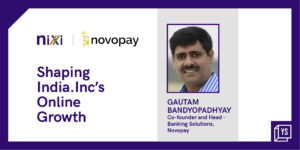With the COVID-19 pandemic causing a widespread health scare, the insurance industry in India saw an influx of new-age tech-driven startups that not only addressed health and other insurance needs, but also disrupted the sector and carved out their niche.
Given this environment, Mumbai-headquartered insurtech startup Symbo Insurance aims to be a dominant player in the embedded insurance segment.
In embedded insurance, products bought by customers, including everyday use articles such as shoes or spectacles, come with insurance attached – and customers don’t have to purchase a plan separately.
This requires understanding customer needs, and this is where Symbo aims to use its five-year experience to differentiate itself.
The startup was founded in mid-2017 to simplify insurance and keep products relevant to user experience.
Understanding nuances
Before focusing on the embedded insurance segment, Symbo used data pools to understand potential customer behaviour and underwriting risks.
For example, Symbo enables insurance coverage for shoes for a brand like Redtape. They noticed that many customers complained about the soles getting damaged when they accidentally placed their foot on the silencer of a two-wheeler, and this was not covered under the warranty of the manufacturer.
It is these kinds of nuances that Symbo aims to bring under its insurance coverage. This entails designing the entire policy by working closely with customers, brands, and insurance companies.
Symbo team (from left): Kartik Poddar -Chief Growth Officer, Mitesh Jain- Co-Founder & Head of Engineering and Adrit Raha – Co-Founder and Co-CEO
Symbo, which has got an insurance broking licence, started its business under the point of sales person (PoSP) model where it sold insurance policies but realised that this needed a lot of bandwidth as well as capital. It then started to focus on the embedded insurance segment in 2018-19, and started to get traction in 2020-21.
In an interaction with YourStory, Adrit Raha, Co-founder and Co-CEO of Symbo Insurance, says, “We want to sell contextual insurances to our distribution partners.”
Adrit, who joined as a co-founder in 2020 following the acquisition of his digital healthcare platform Vivant in 2021 by Symbo, has worked in the insurance industry for many years.
The other co-founders include Mitesh Jain, Anik Jain, Anurag Jaroli, and Nimit Bavishi.
Under the embedded insurance model, Symbo engages with its partners to create products based on their requirements, while at the same time, it also discusses how to structure their plans and influence prices with insurance companies.
“It is the insurance company that will underwrite the product at a price point that we recommend,” says Adrit.
The issuance of the policy, distribution and lastly, any claims on the policies – are all done digitally. “This entire process goes through our proprietary tech platform,” he notes.
The co-founder explains that the company acts like a quasi managing general agent (MGA) where they do the designing and product pricing without actually carrying the risk of underwriting balance sheet. Adrit believes this is a strong moat against the competition.
Presently, a host of companies offer embedded insurance products, including Acko, Ola, and Digit Insurance.
Strong traction
Embedded insurance has started to give Symbo rich dividends as in December 2021, it sold around 90,000 such embedded insurance policies – which rose to 1.1 lakh in January 2022, and then 1.48 lakh the next month. The startup expects to touch 1.65 lakh in March.
“We aim to touch about three lakh policies in the second half of this year and our goal is to reach a million policies by the end of this year,” says Adrit.
Symbo’s customers include Redtape, Lenskart, Decathlon, and Playo with whom the startup designs insurance policies as per their products or services.
“We are actually starting to see the scale that we were looking for,” he notes.
Symbo has been registering around 15-20 percent growth month-on-month in terms of new policies sold. The pandemic has also given a boost to its business prospects.
Last year, Symbo raised $9.4 million in a Series A round of funding from CreditEase Fintech, Think investments, Integra Partners, Insignia Ventures, and AJ Capital.
The team size is around 120 people.
The way ahead
The insurtech startup is now looking at entering newer areas.
For Symbo, this would mean replicating this playbook where it successfully launched insurance policies for products such as shoes, bicycles, spectacles, and fitness equipment. It is also exploring avenues of how it can engage with large ecommerce companies and startups to design customisable insurance products.
Given the success of its tech platform, the insurtech startup is looking at how other insurance companies can leverage it to grow their own business and advance their go to market initiatives.
Towards this end, it has already bagged about 15 odd clients from India and overseas.
“The technology used at large insurance companies is very archaic and complex to manoeuvre. Our platform speeds up the entire process,” says Adrit.
Symbo plans to continue to operate in the general insurance category which largely looks into the property and casualty segments, with elements of health component.
According to India Brand Equity Foundation (IBEF), the overall market size of the insurance sector is expected to touch $280 billion in 2020. However, insurance penetration still remains very low, with the life component at 3.2 percent of the population while non-life components standing at just 1 percent.
Despite this low penetration, the industry, according to Insurance Regulatory Development Authority (IRDAI), is projected to grow at 15-20 percent annually.
According to a report by ResearchandMarkets.com, embedded finance segment is expected to reach $4.8 billion in 2022 and is projected to reach $21 billion by 2029.
Adrit believes the startup’s strength as an insurance operator as well offering its technology platform gives it the required leverage against competition.
“Our business model is strictly on embedded insurance and that is our path to dominance,” says Adrit.









![Read more about the article [Funding roundup] Text Mercato, Moneyboxx Finance, Garuda Aerospace raise early-stage deals](https://blog.digitalsevaa.com/wp-content/uploads/2022/01/VCfunding-1605087354569-300x150.jpg)
